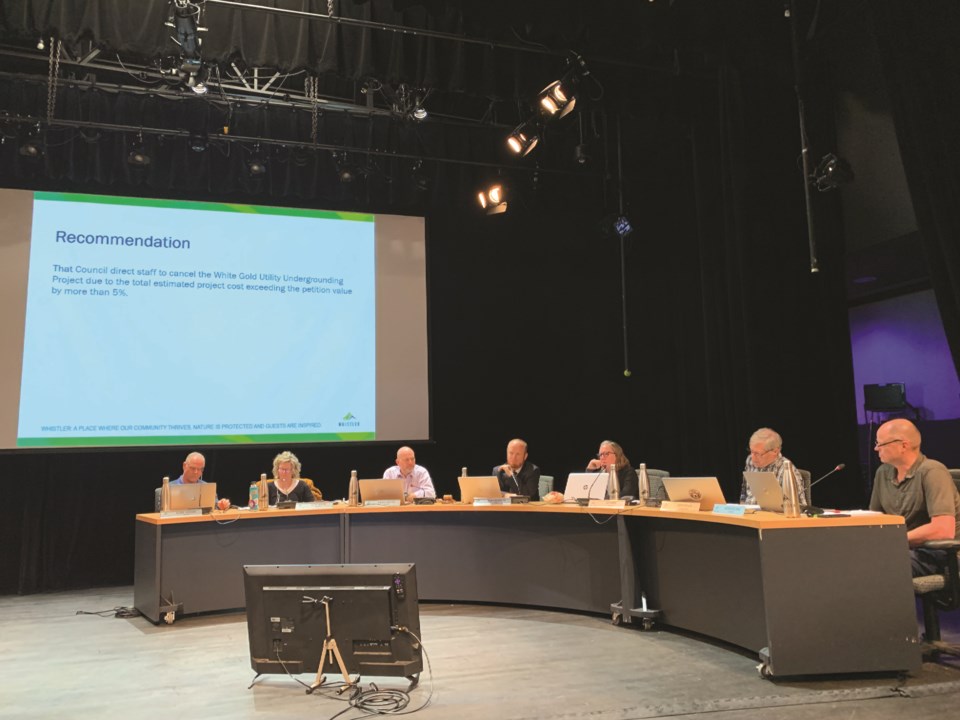Whistler’s controversial White Gold undergrounding project will not go ahead after mayor and council voted to cancel it on July 5.
The vote followed a staff presentation at the July 5 council meeting recommending the project be cancelled due to soaring costs that far exceeded original estimates.
The total cost for the project is now estimated at $9,197,833, a 67-per-cent increase over the initial estimate of $5,520,075 in 2020. Property owners in White Gold would each pay $57,486 in a lump sum payment or $3,479 per year for 30 years to cover the costs.
The increase is due to a multitude of factors, including the rise in construction costs, supply chain constraints and increased Municipal Finance Authority loan interest rates, which have risen considerably from 2.40 to 4.61 per cent over 16- to 30-year payment periods.
Since the costs for proceeding with the White Gold project exceeded the estimates included in the local area service petition by more than five per cent, staff recommended that council cancel the project.
To date, the Resort Municipality of Whistler’s total expenditures spent on the project are about $167,000, including consultant fees for cost estimation, issuing and tabulating petition submissions, developing project communications, detailed design review, utility drawings, tendering services, and responding to owner requests for further information.
Councillor Ralph Forsyth compared the spending on the project to the sunk cost fallacy that comes with renovations.
“You know, you’re renovating your house, and the kitchen is going to cost double the amount. You don’t just keep going. You say forget it. We’re done. So I think there’s some cost fallacy in here, as much as I hate to see tax dollars going away. We did it, but we did it because we have to respond to the community,” said Forsyth.
“I know that there was much consternation in the community about how the process was handled and that it wasn’t handled properly. That is an absolute fallacy. It was handled to the letter the way that it is prescribed in the Charter. It has come to its conclusion because it was too expensive.”
Mayor Jack Crompton echoed Forsyth’s opinion about the local area service petition process.
“This process is the only one available to residents to approach the government and get the government to establish a service. It’s the only one that’s made available to communities,” he said.
“I think that’s why we take this stuff on if there’s only one way to get your government to do something. I think we walk a dangerous path just refusing to engage in that process. That said, I agree wholeheartedly that this project just can’t move forward at this time.”
The project was first brought before council in 2019, when residents of the White Gold neighbourhood requested a formal petition be undertaken to underground all overhead utility lines in the neighbourhood, as well as apply for a BC Hydro Beautification Grant.
The project was awarded a grant for up to $1,236,566, with the remainder of the project’s cost to be paid through a Local Area Service Tax that residents within the White Gold subdivision would have to pay over time.
In August 2020, after a preliminary cost estimate was released that pegged the project’s cost to White Gold residents at $4,620,000, a local area service petition was held in the neighbourhood that resulted in 58 per cent, or 93 of 160 homeowners, voting in favour of the project that would see roughly two kilometres of overhead lines moved underground.
The original budget was expected to cost residents about $38,751 per property, or about 30 annual parcel tax payments of between $1,130 and $1,291 per year.
Following the successful petition, a more detailed assessment of the project was undertaken by C. Boehringer & Associates in coordination with the utility providers to review and approve the final design and prepare detailed cost estimates for the work.
Once the considerably higher cost estimates became known to the public in April 2022, the appetite for moving forward with the project began to shift substantially. Opponents came out in significant numbers to voice their opposition to the project at the April 26 council meeting.
A change.org petition launched by White Gold resident Claire Thornthwaite also gained 308 signatures in opposition of the project.
Should the property owners of the White Gold neighbourhood, or a specific street within that area, wish to continue to pursue the undergrounding project, those property owners must request the RMOW complete another project petition for either the entire neighbourhood or a specific street or area.
The process would follow the requirements set out in section 212 of the Community Charter. However, the existing BC Hydro Beautification grant only lasts until March 31, 2023, meaning that the municipality would have to reapply for the grant for a future proposal.
Following the unanimous vote against the project, an additional motion was moved forward by Coun. Duane Jackson not to repave the neighbourhood for two years, as was recommended by many emails to council.
The motion passed with all in favour except Coun. Cathy Jewett, who wanted to get the paving over with.
“My feeling is that this neighbourhood has been dealing with a construction zone since 2018. It’s now 2022,” said Jewett. “It’s going to be at least another year before this is paved. That’s five years. I think that’s enough. Quite frankly, if it was my neighbourhood, I would want to get it done and get it over with.”
Coun. Jen Ford added that she hopes residents in the neighbourhood can put the issue behind them and come together again.
“Let’s just let the dust settle for a little bit, and hopefully, we can see the neighbourhood come together, [and] have a street party or something because it really hurts my heart to see how much opposition there is on both sides of it, and I think we all just need some time,” she said.





